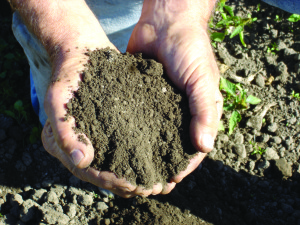Soil Health
The basis for healthy food is healthy soil. For soil to be healthy, populations of soil microbes should be just as diverse underground as populations of flora and fauna are above ground. These microbes are responsible for a multitude of soil properties, like moisture content, soil structure, conversion of elements into forms that plants can use, and transferring nutrients to plants, and ultimately to us.
Just one cup of healthy soil contains more microorganisms than there are people on the planet! They form a complex food web, based on decaying plant and animal matter, and involving countless forms of bacteria, fungi, nematodes and bugs. As they go about their living and dying, they create structures that stabilize the soil and convert nutrients from one chemical form to another.
Soil biota can sustainably produce nutrient-dense foods, as long as nutrients are somehow returned to the soil. But since the beginning of industrial agriculture, this efficient and productive nutrient recycling system has been completely disrupted.
Our reckless use of herbicides, pesticides and chemical fertilizers based on cheap fossil fuels are the basis of the destruction. Monocultures—growing single crops on a very large scale—is the core of industrial agriculture and it relies completely on chemical inputs that destroy soil organisms.
As we lose soil organisms, we lose soil health, and our food is losing nutritional value. Levels of iron, calcium, phosphorus, and vitamins B and C, among others, have decreased in all kinds of vegetables, grains and meats since the 1950s, according to a landmark study by Donald Davis of the University of Texas (UT) at Austin which was published in December 2004 in the Journal of the American College of Nutrition.
Here at Nash’s, we work very hard to keep our levels of organic matter, and consequently the soil biota, high. We do that by building our own compost, cover cropping, and crop rotation, so that nutrients are not sucked out of the soil by the same crop year after year. On our organic farm, we consider every microbe in our rich alluvial soils to be a partner in producing healthy, nutritious food.

